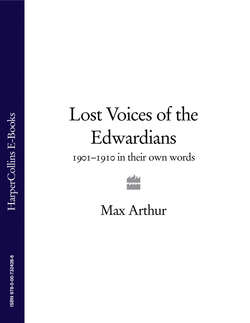Читать книгу Lost Voices of the Edwardians: 1901–1910 in Their Own Words - Max Arthur, Max Arthur - Страница 120
Gordon Frank Hyams
ОглавлениеAt thirteen, I started at Charterhouse. Straight away, we were given an exam by the house monitors, who asked us lots of questions about school institutions, the things you were allowed to do and the things you must never do. They also gave us awkward questions, such as having to name a monitor, and listing the colours he'd won. We had a system of fagging, whereby each monitor had a ‘study fag’ who had to look after his study and keep it neat. I was in a house called ‘Robinites’ and my housemaster was Oswald Latter, a well-known naturalist.
Being in a house meant you lived there, you slept there and you had your meals there. The house system was very strong and there was great competition between the houses over football and cricket. The dormitories were very good. They were divided up into enclosed cubicles, each one containing a bed, a chair and a hand basin. Our clothes were looked after by the matron, who cleaned and distributed them every week. The food was good, on the whole. We had porridge and a fried egg for breakfast, a main course and a sweet for lunch and tea at six o'clock, which was a big meal.
The forms at Charterhouse were sorted by ability, rather than age, so you had some older boys in the lower forms. I started in a form called the Upper Fourth. I was rather fortunate. It was a classical form and the master in charge was a man called Girdlestone. He was a very old man who used to waddle like a duck. He had founded his own house, and it became known by everybody, including the staff, as ‘Duckites’. Girdlestone's method of teaching was very odd. When he gave Latin or Greek prep, you were supposed to look up any words which you didn't know and list them on a piece of paper. During the lesson, he called you up to read your prep and you handed your list in. If you stumbled over a word he'd say, ‘I don't see this word on your list. Why isn't it?’ and you answered, ‘I thought I knew it, sir.’ He was a dear old boy and we were very sorry to see him go.
